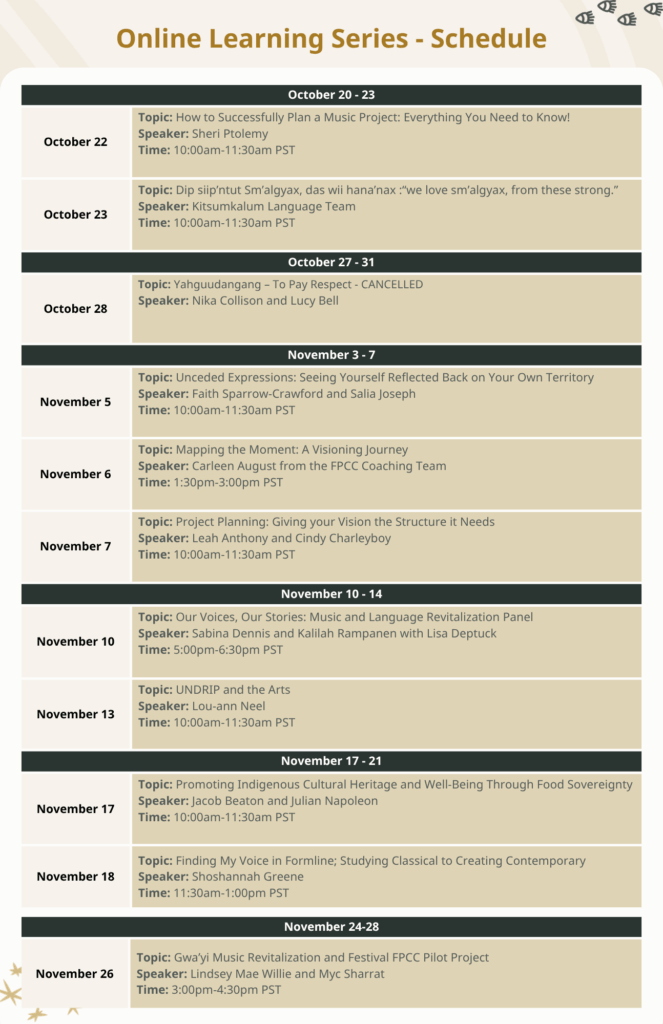FPCC’s Online Learning Series features events that aim to inspire, inform and foster collaboration among those involved in language, arts and cultural heritage revitalization projects. These events are free to attend but you must register in advance. They are open to all that are involved in revitalization work. Webinar recordings will be available on YouTube for public viewing at the end of the series.
FPCC’s Learning Series began in 2023 with our Summer Learning Series and continued in 2024 with our Online Learning Series, both having a primary focus of language revitalization. For more information about these events, links to previous webinars, speaker bios and Q&As, please visit the dropdown menu below.
FPCC Arts Online Learning Series 2025
FPCC is excited to announce our 2025 Online Learning Series, called ‘Our Stories, Our Voices’!
FPCC is hosting this year’s online gathering. It will feature interdisciplinary artists to foster networks and knowledge exchange, support B.C. First Nation voices, and assist skill-building and self-determined development of B.C. First Nations artists.
This year’s 2025 Online Learning Series is a follow-up to our 2024 Arts Retreat, which took place in person in Syilx Okanagan territory. You can watch the video or the read the recap by visiting, fpcc.ca/stories/fpcc-arts-retreat/.
This free online webinar series is open to anyone involved in revitalization work. Our webinar presenters include leaders of successful Indigenous arts, language and heritage projects from B.C. First Nations communities. They will share an overview of their work and journeys, including their successes and lessons learned.
Building on the success of the 2024 Online Learning Series, these webinars aim to inform, inspire and provide hands-on, practical knowledge. Topics include music initiatives, artistic professional development, arts revitalization, as well as repatriation, food sovereignty and language initiatives.
Registration and Fees:
The Online Learning Series will take place throughout October and November 2025. Each webinar will be free to attend and open to anyone involved in revitalization work.
To register for a webinar, click the drop down titled “Online Learning Series – Registration”, and find the registration links after each webinar description. You must register individually for each session you would like to attend.
FPCC Learning Series – Speakers
How to Successfully Plan a Music Project: Everything You Need to Know!
Date: Wednesday October 22, 2025, 10:00am-11:30am PT
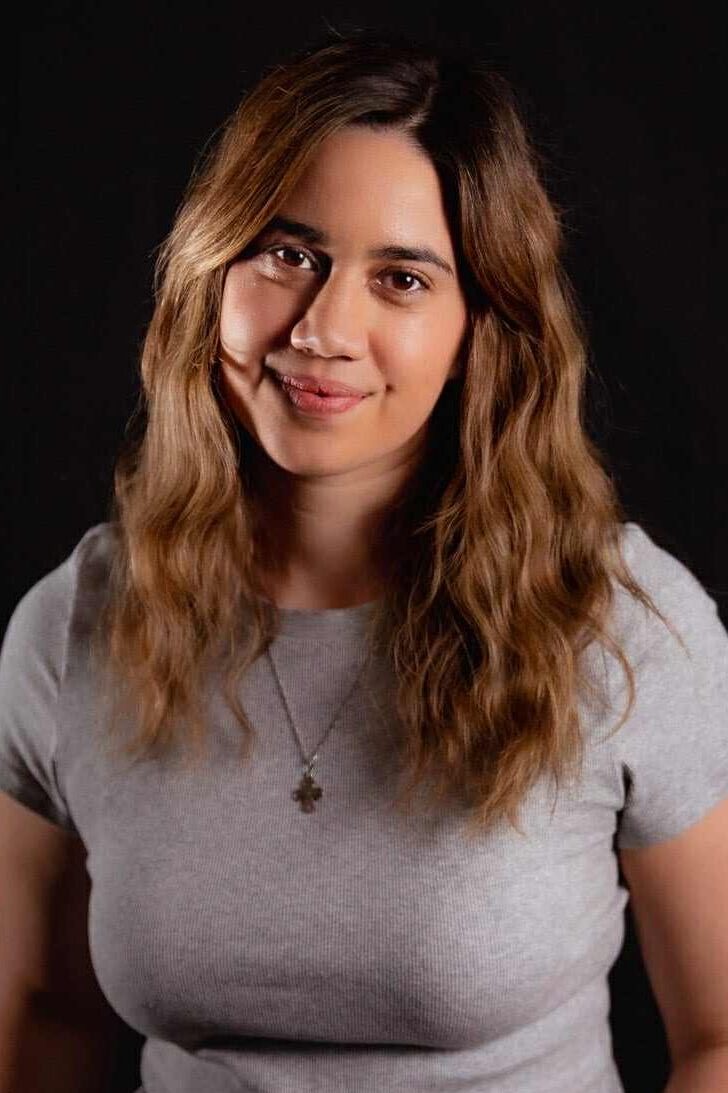
Sheri Marie Ptolemy
Sheri Marie Ptolemy is an Indigenous country singer-songwriter from Samahquam First Nation. Her love for music began early, serenading her dog and the birds outside her window at just five years old. By 14, she was taking voice lessons, teaching herself piano and guitar and writing original songs she first performed at her local church.
Sheri holds a Bachelor of Arts in Creative Writing from the University of British Columbia and a certificate in General Music from Berklee College of Music. Since graduating, she has been in the studio nonstop, writing and recording original songs that reflect her growth as both an artist and storyteller. Her music draws from classic country roots and emotional storytelling, often exploring themes of self-worth, home, love and heartbreak, all delivered with a confident voice and lyrical honesty.
In addition to songwriting, Sheri is a passionate filmmaker who directs and edits all her own music videos. She also shares weekly vlogs on her YouTube channel, offering a glimpse into her charming life in the coastal mountains. From lyrics to visuals, her work is rooted in authenticity, tradition and creative independence. Sheri knows who she is and she is not afraid to say it.
Dip siip’ntut Sm’algyax, das wii hana’nax :“we love sm’algyax, from these strong women”
Webinar date: Thursday October 23, 2025, 10:00am-11:30am PT

Dm Syl Haaytk Gyibaaw | Emily Bryant
Dm Syl Haaytk Gyibaaw, Emily Bryant, holds the name “the one that stands with the wolves” from the House of Wadi Waay, Kitsumkalum Wolf Clan.
Dm Syl Haaytk Gyibaaw has grown up surrounded by Sm’algyax teachings but has intentionally immersed herself in Sm’algyax since 2019. This includes online learner led initiatives, online classes with South East Alaska University and being a Language Lead Coordinator within her community of Kitsumkalum. She also successfully completed three years of the Mentor Apprentice Program (MAP Connections) with the First Peoples’ Cultural Council.
Along with documentation and assistance from fluent speakers and some courses completed with the University of Victoria –she continues to learn to better serve Kitsumkalum and Sm’algya̱x.
Dm Syl Haaytk Gyibaaw continues to be inspired by Ts’msyen storytellers and hopes to be one herself. She aims to create a loving, safe space for Sm’algya̱x teachings to thrive and build up confidence and curiosities with adult language learners so we can all tell our stories.
“Our language is an invitation to tell you about who we are, where we come from. To hear your stories, in your language.”
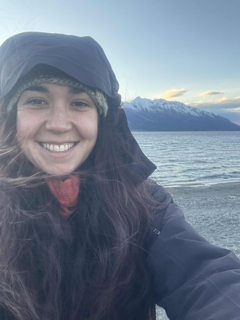
Ama G̱oodm La̱xsüülda | Ocean-Lynn Georgelin
Ocean-Lynn’s Ts’msyen name is Ama G̱oodm La̱xsüülda (calm spirit of the ocean).
She is a member of the Raven Clan and lives on Ts’msyen territory near her community, Kitsumkalum. Ocean-Lynn grew up hearing traditional stories shared with her by her mother and community Elders. As a young adult, she has chosen to immerse herself in Sm’algyax (Ts’msyen language), storytelling and teaching.
Ocean-Lynn is a four-time recipient of the Youth Empowered Speaker’s grant and has received a certificate of First Nations Language and a Bachelor of Education from the University of Northern BC.
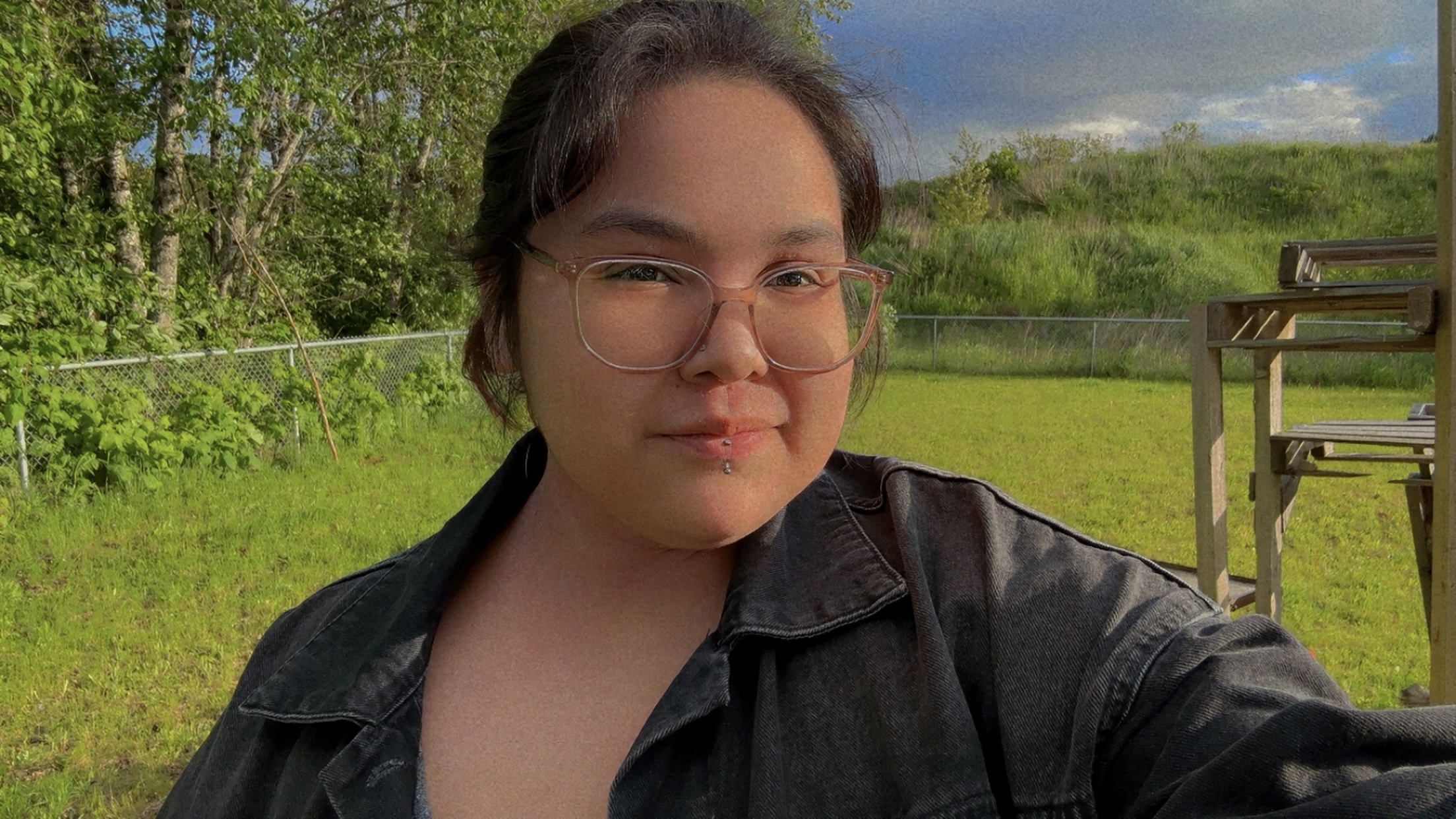
Maadm Gyeks | Annika Bryant
Maadm Gyeks which means “Snowflake falling gently” is Annika Bryant’s Ts’msyen name. She is from the Kitsumkalum La̱xgyibuu clan, and lives and works as the Kitsumkalum Sm’algya̱x Assistant in her community of Kitsumkalum.
Maadm Gyeks is a proud graduate of the Kitsumkalum Headstart and ‘Na Aksa Gyilak’yoo School (NAGK), where she received the Cultural Ambassador Award for 2018/2019. She is not only passionate about Sm’algya̱x, but also deeply rooted in her culture showcasing her skills as a singer and dancer. With a keen interest for technology and artistic creativity, she keeps an open mind in whatever she does and is always seeking new ways to express herself.
Maadm gyeks is inspired daily by her dream to become fluent in Sm’algya̱x, with the help, inspiration and love from family – especially her sister Emily Bryant (Dm Syl Haaytk Gibaaw), and her parents, Sharon Bryant (Litamlaxdaw Gibaaw) and Darryl Bryant (‘Wii Waap’m Gaax). She holds all her family’s teachings close to her heart.
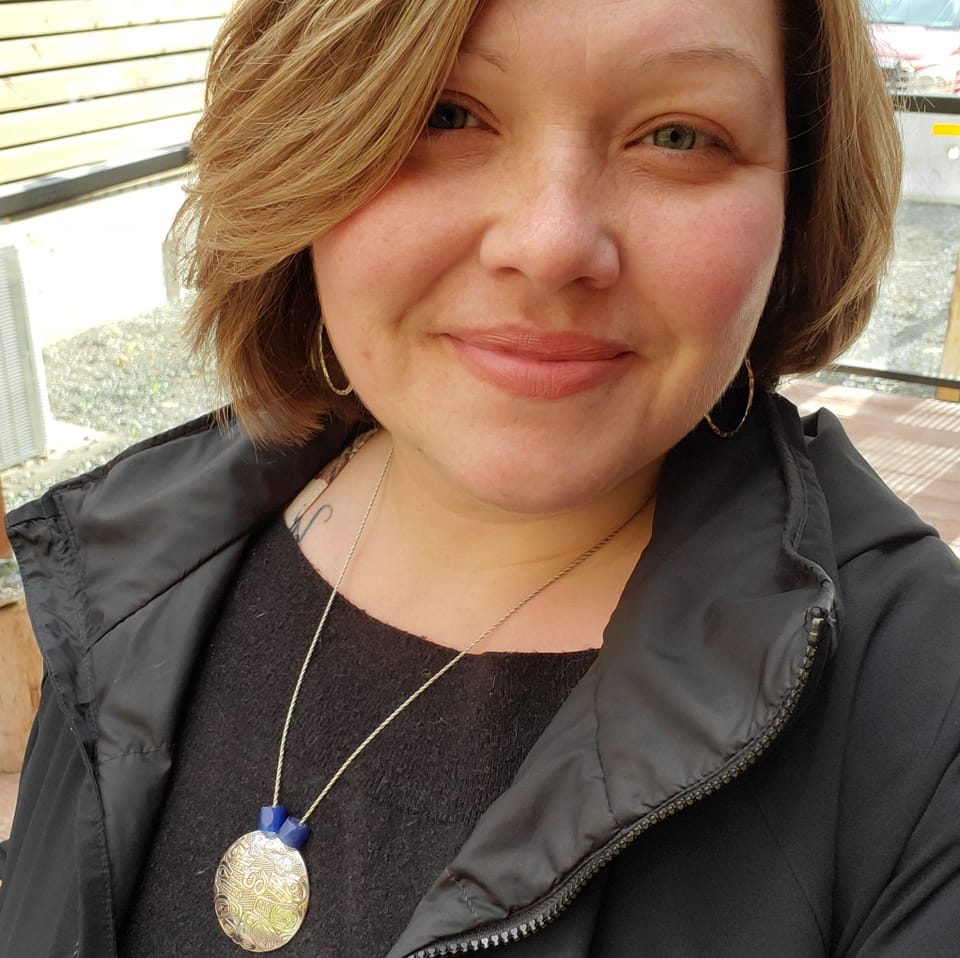
Dekhāmā | Kimberly Godfrey
Dekhāmā ( Kimberly Godfrey ) is a passionate Sm’algya̱x learner and advocate for Indigenous language and culture. Dekhāmā is matrilineally Tāłtān – her crest is Tsesk’iye and her clan is Tehkahche – and matrilineally Gitxsan from her grandfather. Born and raised in Kxeen, she has a deep love and respect for the Ts’msyen culture, teachings, communities and Sm’algya̱x. Her Sm‘algya̱x learning journey began in grade 5 and continued as she graduated high school. She is also learning her great-grandmother’s first language, Sim Algyax / Gitxsanimx.
As the Kitsumkalum Sm’algya̱x Assistant Team Lead, Dekhāmā is deeply rooted in community, culture, language and ceremony. She is dedicated to inspiring others to connect with their roots and embrace the richness of language and culture. As a daughter, granddaughter, aunt, niece, sister and friend, she cherishes her roles within her family and community and is a proud dog mom to Tehkahche and Luna.
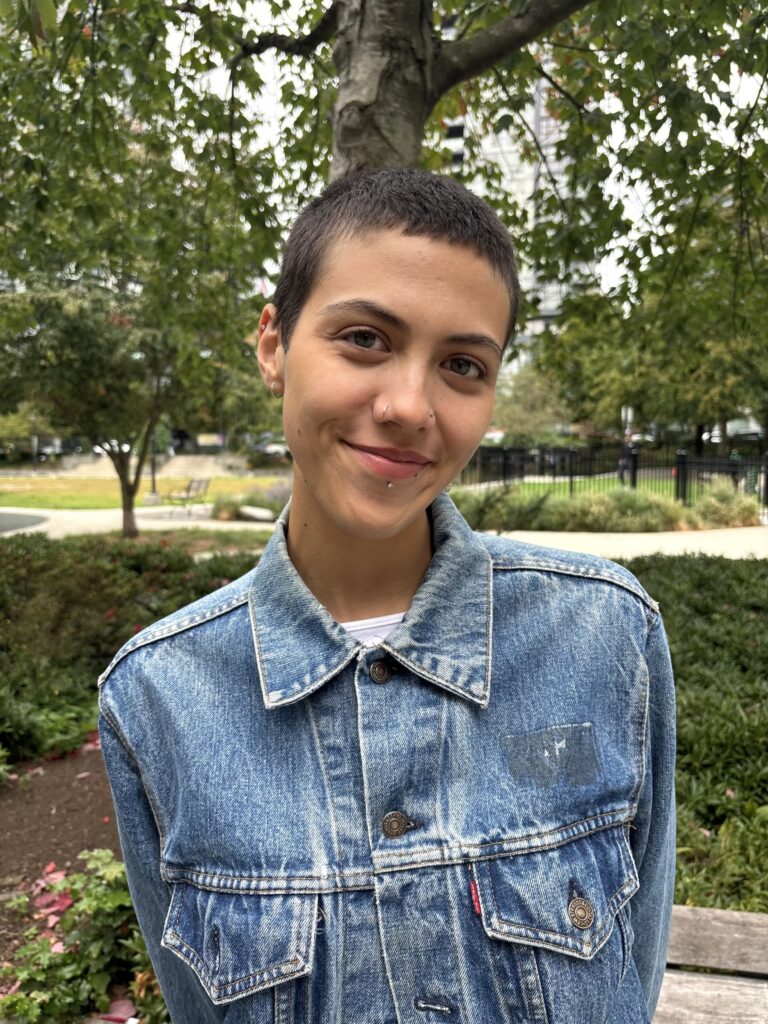
Lisa Deptuck
Lisa Deptuck is a queer storyteller, Sm’algyax learner, and musician from the Kitsumkalum Ganhada (Raven) clan of the Ts’msyen Nation. Gratefully living on lək̓ʷəŋən and W̱SÁNEĆ territory, now known as the Songhees and Esquimalt Nations, Lisa is determined in her storytelling and Sm’algyax journey.
After two years of learning Sm’algyax online with Shugayna (Donna May Roberts) and a community of learners, Lisa spent three years completing 300 hours of immersion in the Mentor-Apprentice Program with her mentor Huhuułk (Theresa Lowther) through First Peoples’ Cultural Council.
Lisa tenderly holds teachings from her late grandmother, Adeline Roper, her mother Arlene Deptuck and her late mentor, Huhuułk (Theresa Lowther). These teachings and stories walk between the physical, the supernatural and the spirit world, Lisa humbly walks alongside them, opening her heart and spirit to be a caring home for Sma’lgyax.
Yahguudangang – To Pay Respect – CANCELLED
Webinar date: Tuesday, October 28, 2025, 10:00am-11:30am PT
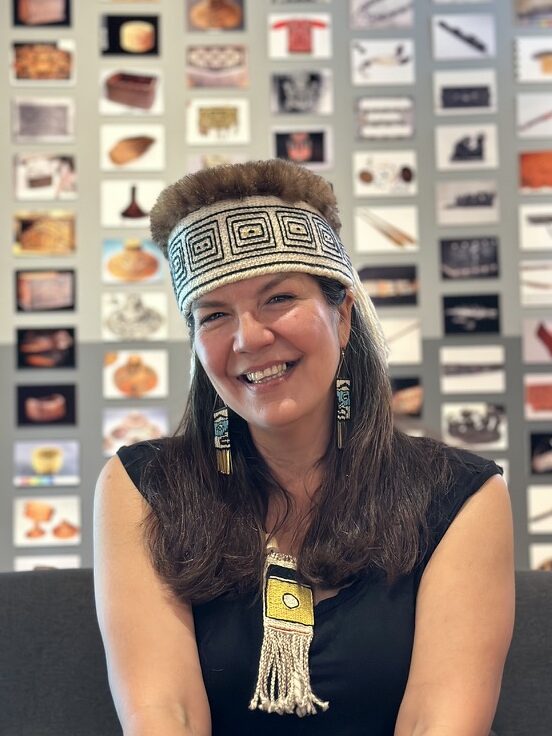
Jisgang | Nika Collison
Jisgang Nika Collison belongs to the Kay’ahl Laanas of the Haida Nation. She is the Executive Director of Saahlinda Naay/Haida Gwaii Museum at Kay Llnagaay and has worked in the field of Indigenous language, arts and culture for almost 30 years. Deeply committed to reconciliation, Nika is co-founder and co-chair of the Haida Repatriation Committee. She pursues reparation and relationships with colonial heritage institutions on a global scale.
Nika serves on several boards and advisories, and presents, consults and publishes globally. She is co-author of the Indigenous Repatriation Handbook (RBCM 2019) and the First Peoples’ Cultural Council report, From Stealing to Healing: Repatriation and B.C. First Nations (2025), both are the first of their kind in Canada. Nika is a life-long, Nation-based scholar of all things Haida.
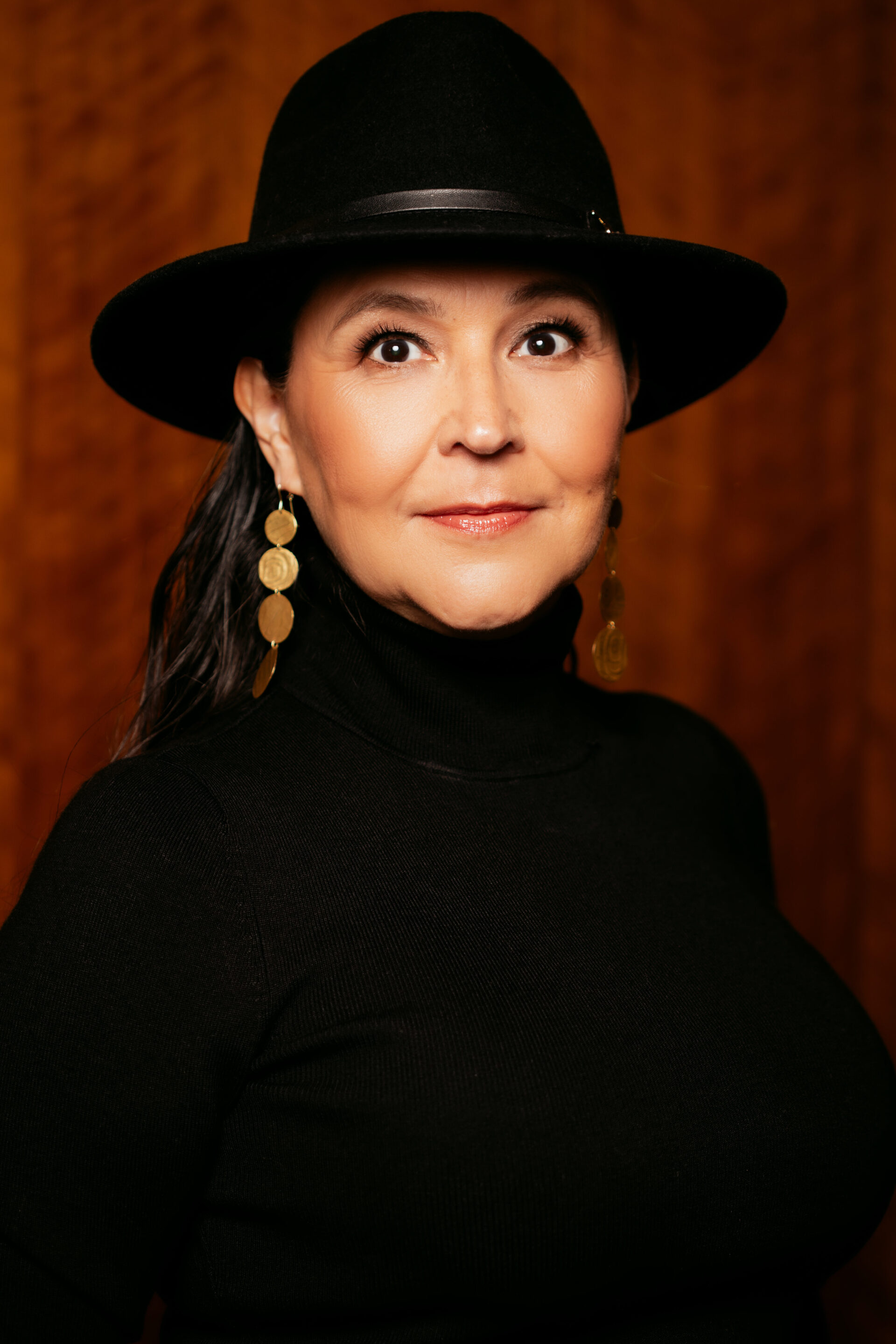
Dr. Sdahl Ḵ’awaas | Lucy Bell
Dr. Sdahl Ḵ’awaas, Lucy Bell, from Old Massett, Haida Gwaii, is a Haida museologist and scholar with 30 years of experience in heritage revitalization and repatriation. As the co-founder and co-chair of the Haida Repatriation Committee, she has helped return hundreds of Ancestral remains and Belongings. She co-authored the Indigenous Repatriation Handbook (2019) and From Stealing to Healing: Repatriation and B.C. First Nations (2025)
As the first Head of Indigenous Collections and Repatriation at the Royal BC Museum, Lucy challenged systemic racism and helped spark national change in the heritage sector. She continues to support the museum sector as a board member of the Canadian Museum Association and as an Indigenous advisory member to the BC Museums Association.
Her PhD, Tla Yahda: Haida Museology Makes Things Right (2025), speaks to how her Haida Ancestors strived to make things right, just as the Haida do today as we repatriate and work with the museum sector.
In 2025, Lucy was the proud recipient of the BC Reconciliation award and the King Charles Coronation medal.
Unceded Expressions: Seeing Yourself Reflected Back on Your Own Territory
Webinar date: Wednesday, November 5, 2025, 10:00am-11:30am PT
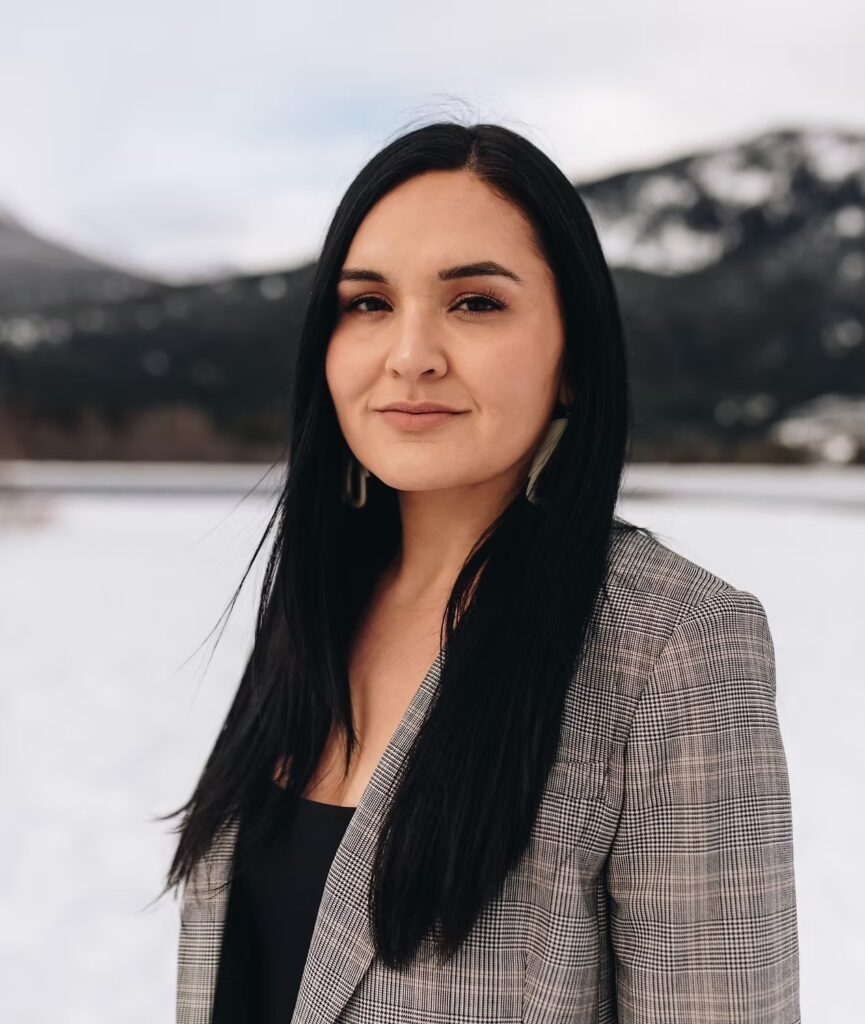
Salia Joseph
Salia Joseph is from the Sḵwx̱wú7mesh and Snuneymuxw First Nation’s on her father’s side and is British and Jewish on her mother’s. She is a graduate of the critical Indigenous studies program at the University of British Columbia. Salia is the executive director of The Sníchim Foundation, a Sḵwx̱wú7mes language revitalization non-profit. She is also the co-owner of Host Consulting Inc., a public art consultancy that focuses on elevating the presence, designs, and work of Musqueam, Squamish and Tsleilwaututh artists. Salia is very grateful to come from such generous people and is always looking for ways to show reciprocity.
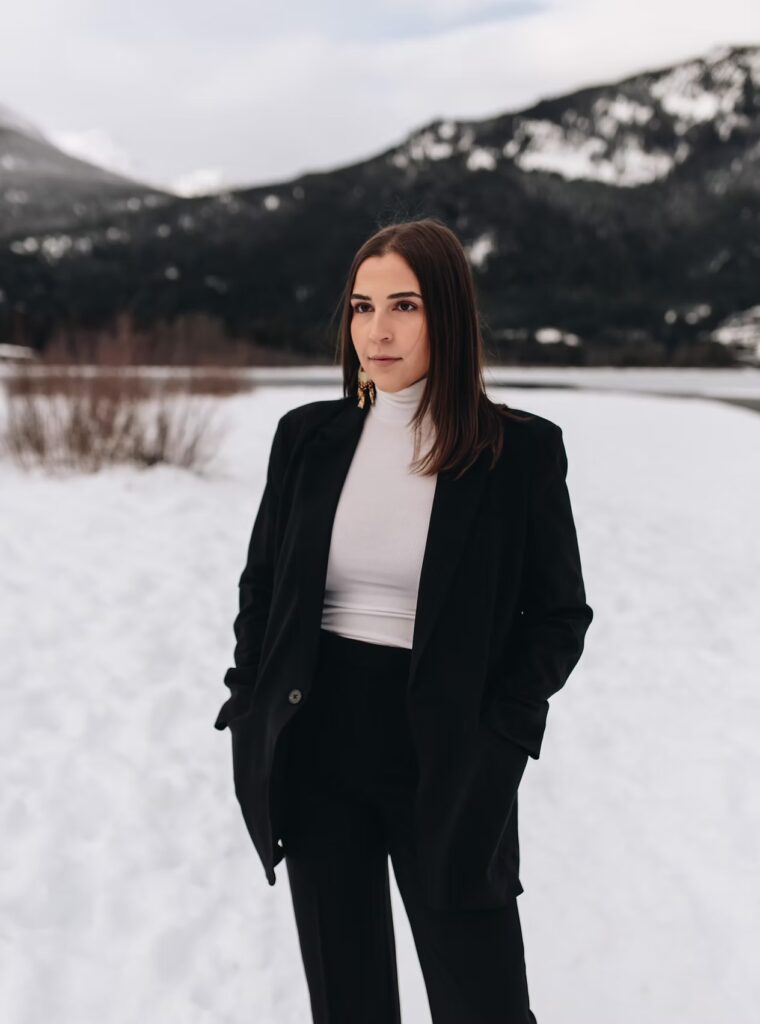
Faith Sparrow-Crawford
Faith Sparrow-Crawford is from the Musqueam Indian Band in Vancouver, B.C. Raised by generations of storytellers and artists, she grew up surrounded by a rich culture and oral histories that sparked her passion for the arts. She graduated from the University of British Columbia in 2017 with a degree in First Nations and Indigenous Studies, focusing on Indigenous new media. After graduation, she worked for her Nation on self-governance, helping draft a constitution grounded in Musqueam traditions and protocols.
In 2019, Faith co-founded Salish Locations Inc., a film liaison company dedicated to Indigenous representation in the film industry. She later co-founded Host Consulting Inc., a public art consultancy with Squamish and Tsleil-Waututh partners, advancing opportunities for MST members through art.
An emerging writer, director, and producer, Faith has been developing film and television projects since 2017.
Mapping the Moment: A Visioning Journey
Webinar date: Thursday, November 6, 2025, 1:30pm-3:00pm PT
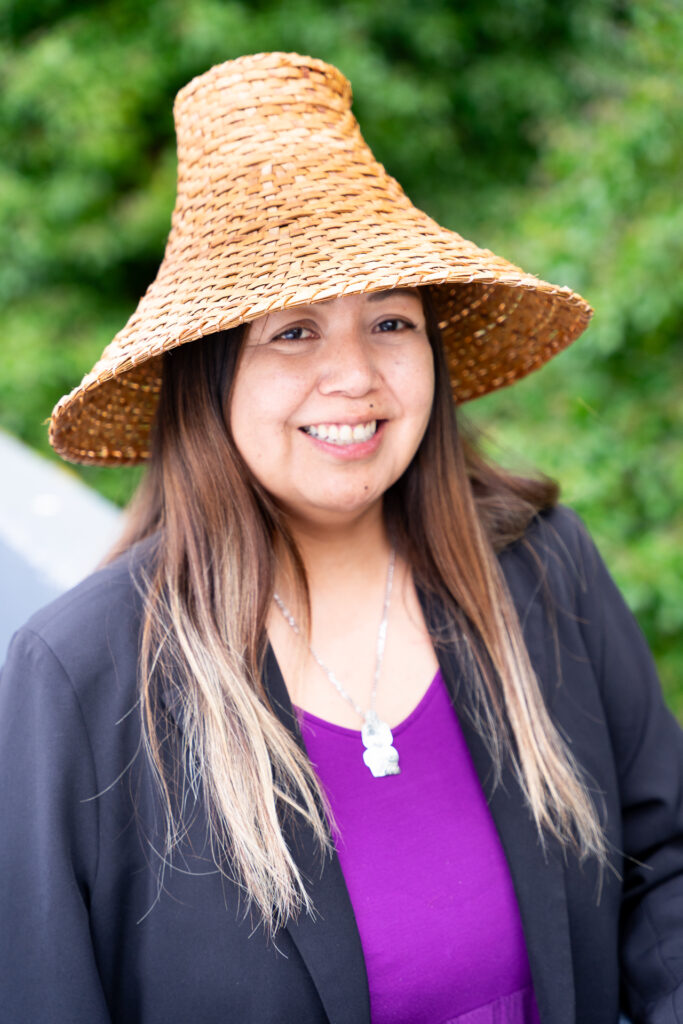
Carleen August
‘een’thu stimaat tun’ni’tsun utl’ quw’utsun. Carleen is from the Quw’utsun territory; her traditional name is stimaat. She proudly walks in the footsteps of her late grandmother, Sti’tum’atul’wut Dr. Ruby Peter, whose name was passed down from her own grandmother. Carleen carries forward her grandmother’s legacy in Hul’q’umi’num’ language revitalization, honouring the deep roots of matriarchal knowledge and dedication to cultural resurgence.
Additionally, she maintains the traditional values of her paternal lineage, rooted in the strength, discipline, and connection to the land and waters through traditional canoe building and paddling. Her family has been involved in constructing and paddling traditional war canoes for many generations. These practices represent a way of life grounded in wellness, community and cultural continuity. These strong familial foundations have shaped Carleen’s holistic worldview, focusing on ingenuity, cultural resilience and the strength of people who thrive through adversity.
Her professional experience includes community engagement, communications and the implementation of community development programming. Prior to joining FPCC, she supported the Cowichan Watershed Society in the development of the Koksilah Watershed Plan, a government-to-government agreement focused on protecting and caring for the Waters and Earth connected to the Koksilah River.
Carleen has planned, organized and facilitated numerous community events, gatherings and forums throughout her academic and professional journey. She fosters a team-centered approach to planning that honours diversity and unique societal perspectives. Known for her kind heart and calm demeanor, she excels at identifying opportunities for creating streamlined, meaningful and efficient operations that support community empowerment and cultural revitalization. empowerment and cultural revitalization.
Project Planning: Giving Your Vision the Structure It Needs
Webinar date: Friday November 7, 2025, 10:00am-11:30am PT
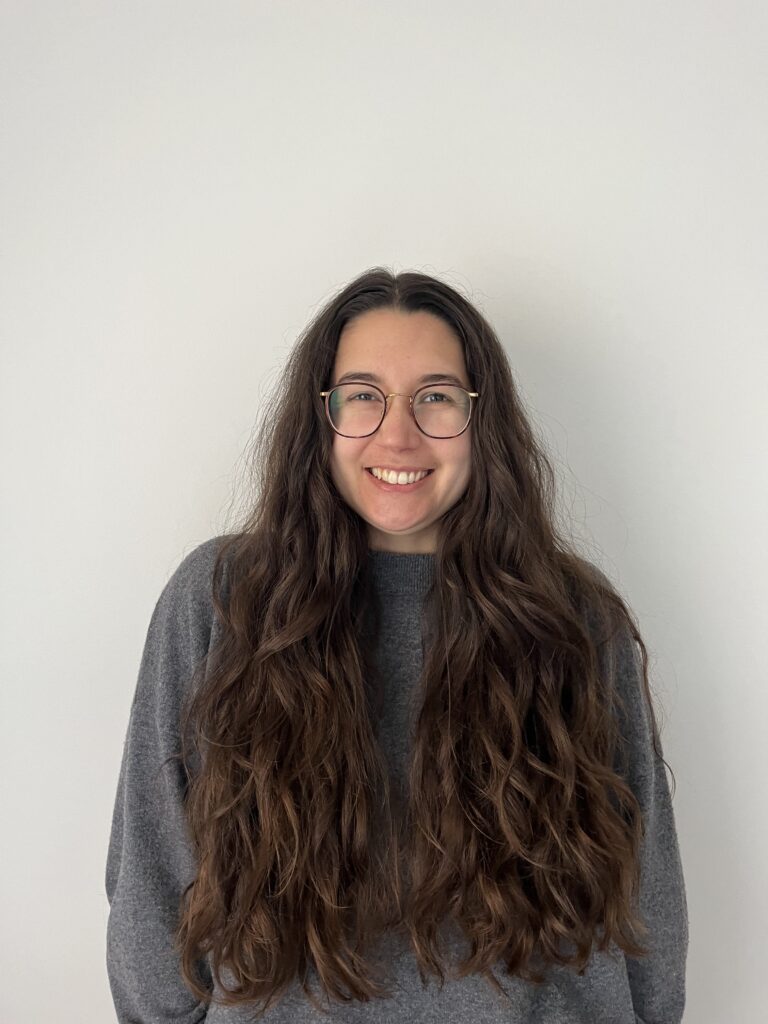
Leah Anthony
Leah is of the Nak’azdli Whut’en band as well as Portuguese on her mother’s side and French Canadian and English/Irish on her father’s side. She joined FPCC in 2021 and supports the Individual Artists Program as an Arts Program Coordinator. She received her Bachelor of Fine Arts in Theatre and Environmental Studies at the University of Victoria in 2020 and is currently pursuing her Master of Urban Studies at Simon Fraser University.
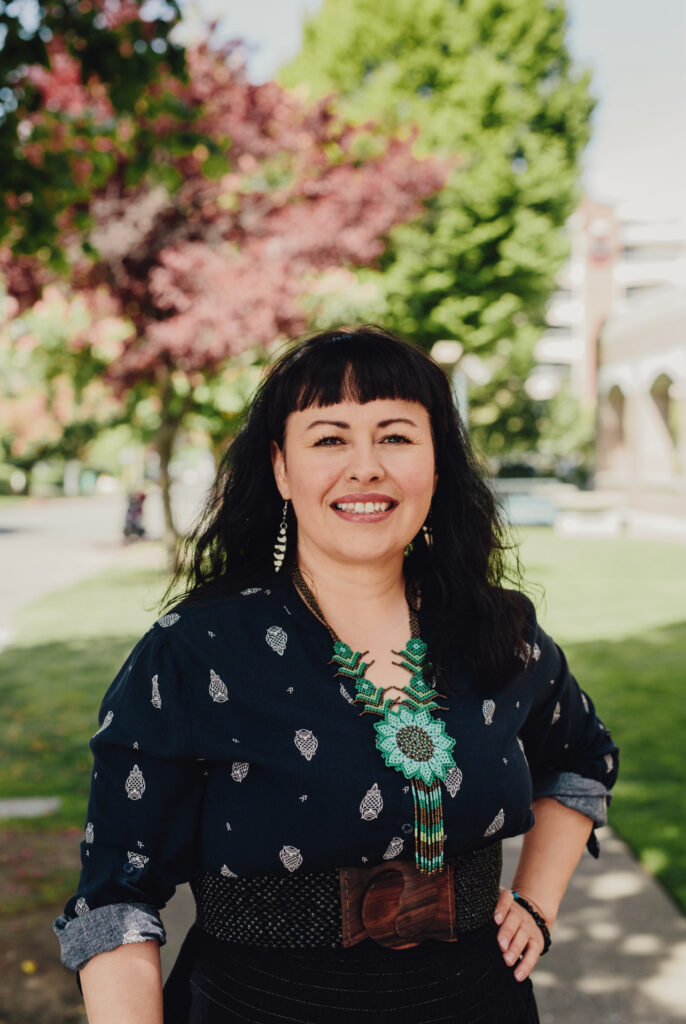
Cindy Charleyboy
A traditional dreamer, singer, and mixed media artist, Cindy is Tsilhqot’in, Secwepemc and Norwegian from the Interior of British Columbia. She has a range of experience working within B.C. First Nations communities and supporting First Nations people and initiatives with program delivery, advocacy, outreach and wellness.
Cindy has been working with the Arts Team of First Peoples’ Cultural Council since August 2022 and works mainly with the Individual Artists Program. She has a Bachelor of Arts in First Nations Studies and specializes in Creative Facilitation. Cindy believes that Arts have the ability to transform us.
Our Voices, Our Stories: Music and Language Revitalization Panel
Webinar date: Monday November 10, 2025, 5:00pm-6:30pm PT
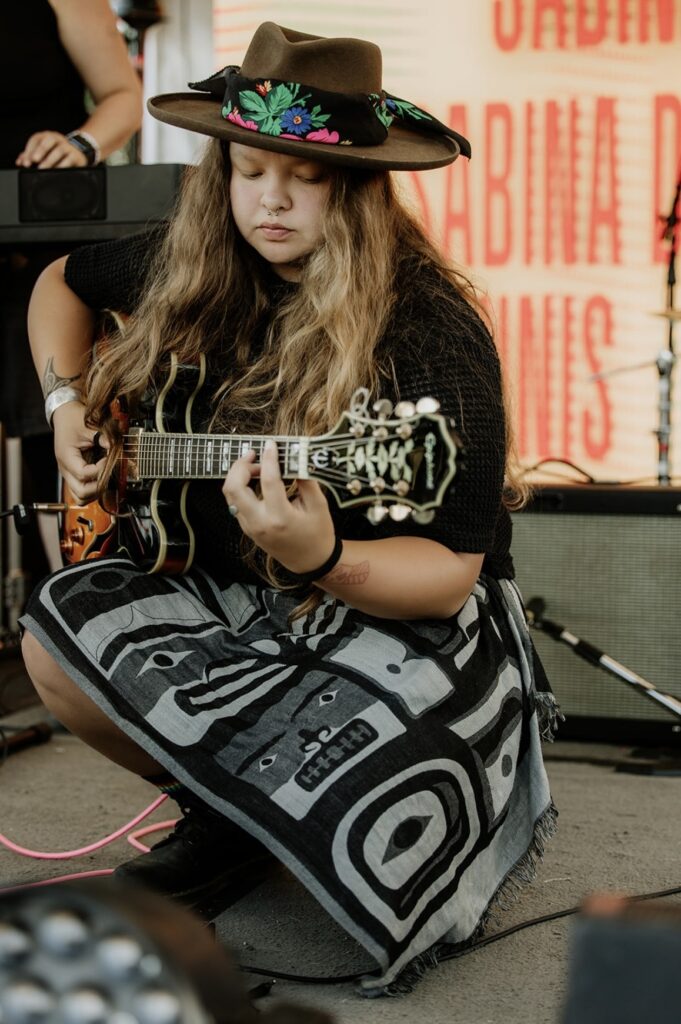
Hasaatuk | Kalilah Rampanen
“Hasaatuk” meaning loud voice in their nuučaan̓uł (nuu- chah-nulth) language, comes from their traditional homelands of Ahousaht on the west coast of Vancouver Island, B.C.
Her music explores a diverse range of indigenous, environmental and social horizons, combining a blend of acoustic, blues and alternative styles of expression.
In addition to her musical path, Hasaatuk is actively involved in activism and advocacy for the protection and preservation of Indigenous lands, culture and language. She uses her music to shed light upon the interconnectedness that is maintained through ancestral, Indigenous roots to the lands and waters she grew up on. She also maintains a lifestyle that keeps her connected to her traditional territories, culture and family.
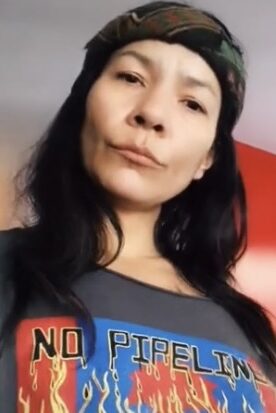
Sabina Dennis
Sabina Dennis is a woman of Dakelh Nation, residing in Nadleh. She is currently the Dakelh Language and Culture Teacher with School District 91. Sabina is also one of the Cultural Administrators/Representatives of 2 Rivers Remix Society, an organization co-founded by Meeka Morgan and Gordon Murray. The society focuses on bringing rural Indigenous communities together in celebration to witness live music, artists at work painting and showcasing their art, and dancers – all art forms both in contemporary and traditional styles.
Sabina’s passion for her people’s culture has been lifelong; she has dedicated herself to following her heart, ensuring her traditional values are passed down to future generations. By living and being as free as possible, she has created beautiful, original art forms, musical compositions, paintings, clothing, dance and video. Sabina’s dedication to upholding Dakelh ways of knowing and being has brought her to many “frontlines,” to mention a few: The Working Group on Indigenous Food Sovereignty, Wild Salmon Caravan, International Indigenous Leadership Gatherings, Indigenous Climate Action, and of course the well-documented work with her fellow peoples, the Wet’suwet’en. Sabina is in the movie, The Yintah.

Lisa Deptuck
Lisa Deptuck is a queer storyteller, Sm’algyax learner, and musician from the Kitsumkalum Ganhada (Raven) clan of the Ts’msyen Nation. Gratefully living on lək̓ʷəŋən and W̱SÁNEĆ territory, now known as the Songhees and Esquimalt Nations, Lisa is determined in her storytelling and Sm’algyax journey.
After two years of learning Sm’algyax online with Shugayna (Donna May Roberts) and a community of learners, Lisa spent three years completing 300 hours of immersion in the Mentor-Apprentice Program with her mentor Huhuułk (Theresa Lowther) through First Peoples’ Cultural Council.
Lisa tenderly holds teachings from her late grandmother, Adeline Roper, her mother Arlene Deptuck and her late mentor, Huhuułk (Theresa Lowther). These teachings and stories walk between the physical, the supernatural and the spirit world, Lisa humbly walks alongside them, opening her heart and spirit to be a caring home for Sma’lgyax.
UNDRIP and the Arts
Webinar date: Thursday, November 13, 2025. 10:00am – 11:30am PT
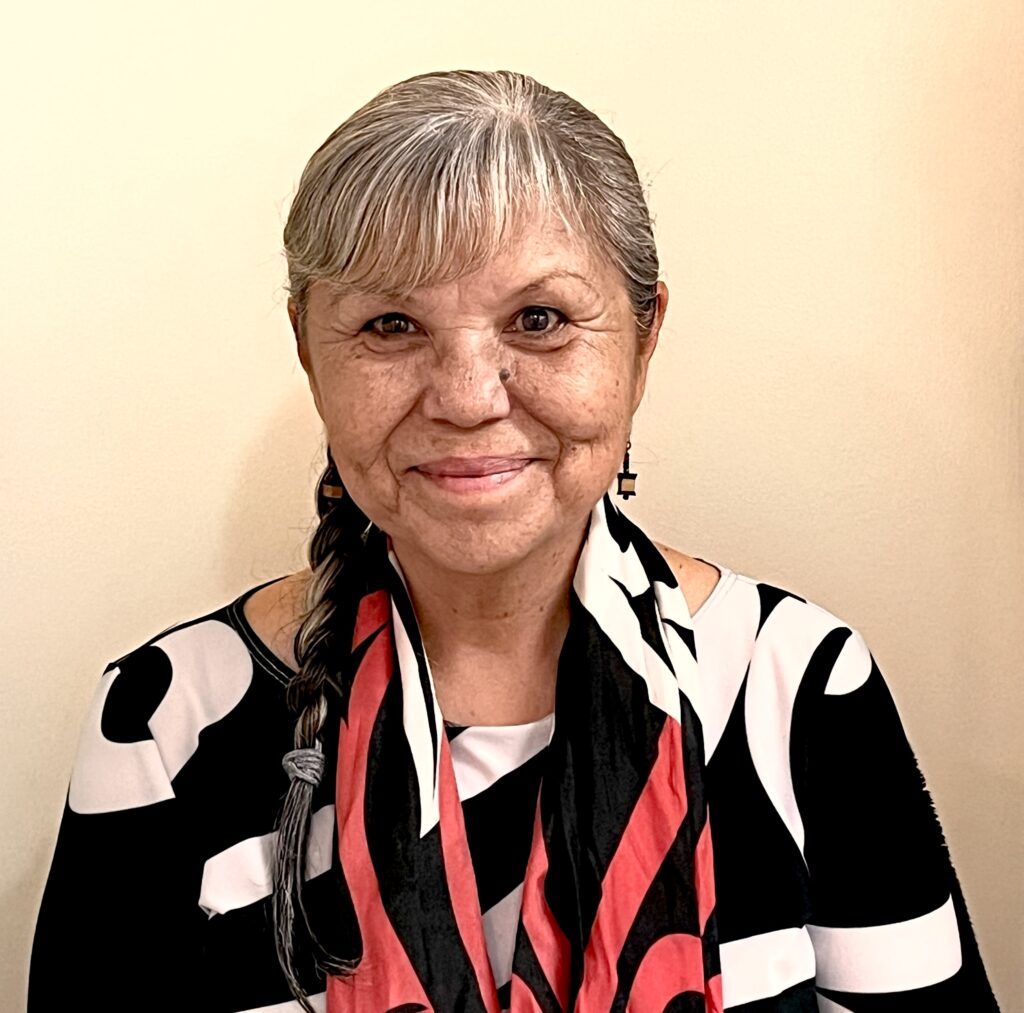
Lou-ann Ika’wega Neel
Lou-ann Ika’wega Neel is from the Mamalilikulla, ’Namgis, Mumtagila, Kwickwasutaineuk, Da’naxda’xw and Kwagiulth peoples of the Kwakwaka’wakw. Lou-ann is a practicing visual artist, working in the mediums of acrylic and oil painting, jewelry design, wood carving and digital (vector) design. Lou-ann has also worked as a policy analyst and program manager in the arts, language, and culture sectors for over 35 years.
“In my role as an arts policy and program professional, one of my favorite things to do is to teach community members about grant writing – I’ve been fortunate that this has always been a part of my professional practice, and I see it as one of the ways that I can consistently give back to community in a meaningful way; it brings such joy to my heart to see the next generation of artists build their professional practice and to be able to express themselves freely in all artistic mediums.”
Promoting Indigenous Cultural Heritage and Well-being through Food Sovereignty
Webinar date: Monday November 17, 2025 10:00am-11:30am PT
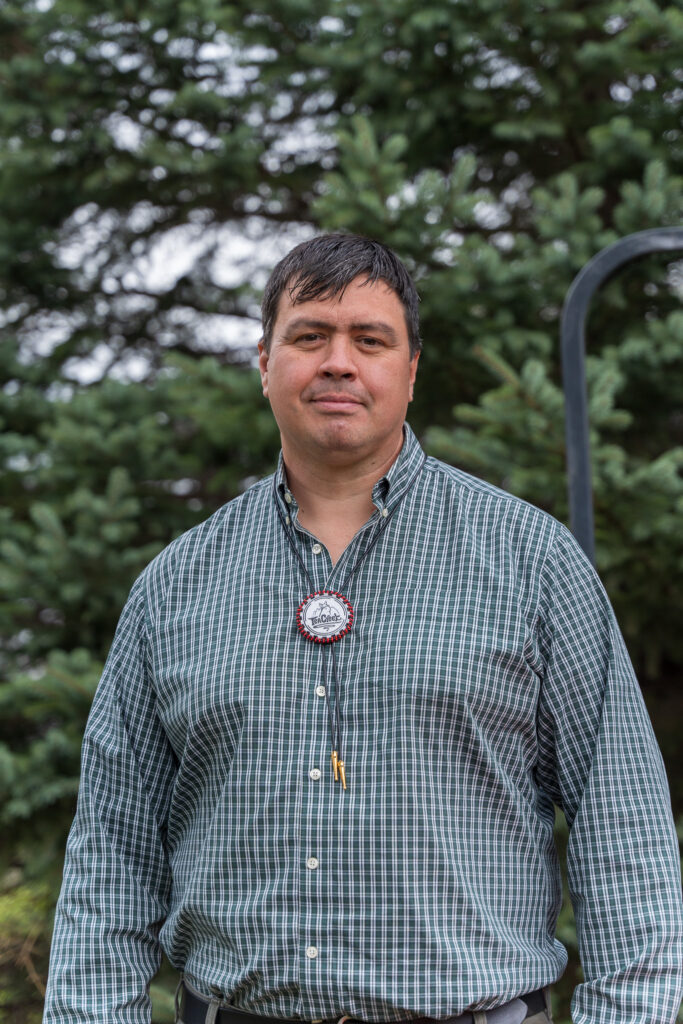
Jacob Beaton
Jacob leads Tea Creek in an innovative, holistic model that is award-winning, Indigenous-led, land-based and culturally safe. Jacob Beaton has provided business, negotiation, real estate, management and leadership support to Indigenous clients. He is an award-winning Indigenous business leader and acclaimed public speaker.
An innovator who has successfully combined leading-edge technology and practice with Indigenous principles, Jacob is a firm believer in good process, data and the strength of Indigenous culture. Jacob traces his heritage to Haida Gwaii, Heiltsuk (Bella Bella), Gitxaala (Tsimshian) and the British Isles. He has the name Dzapł Gygyaawn Sgyiik (an eagle who gets it done right now) from the Gispaxloats tribe.
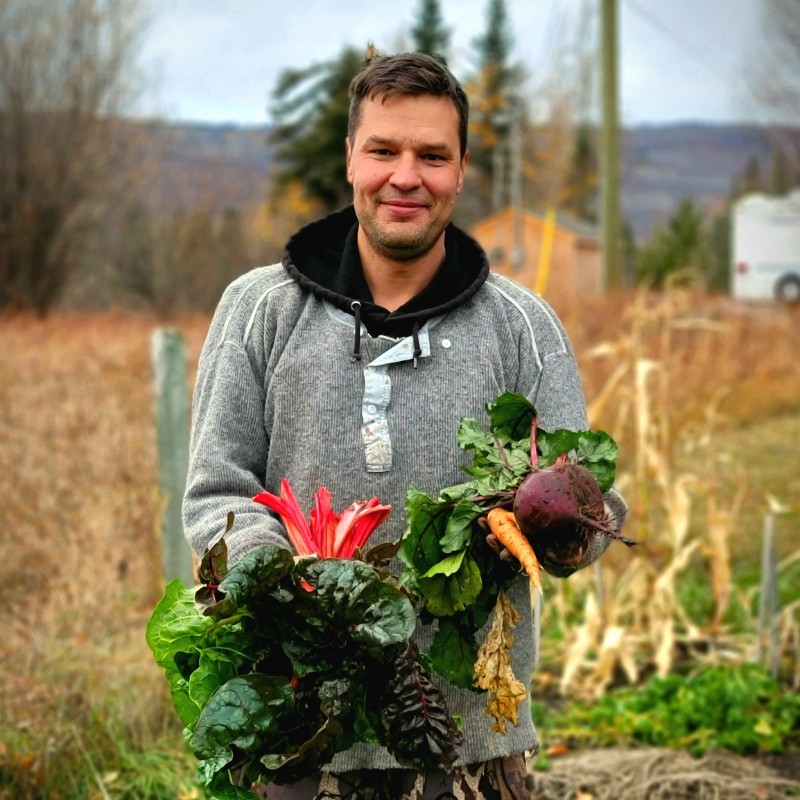
Julian Napoleon
Julian Napoleon is Dane-zaa and Cree from the Peace River region. Julian grew up immersed in the subsistence practices of his family and community – hunting, fishing, foraging and learning cultural protocols. Julian studied applied biology in Food & Environment at the University of British Columbia. He has also spent many years studying and practicing small-scale organic agriculture. Julian worked with his nation as the head grower at Twin Sisters Native plant nursery. He owns and operates Amisk Farm and runs Klinse-za Co, a contracting and consulting company focusing on a diversity of land-based and governance projects. His passions include Indigenous agriculture, agroforestry, fitness, entrepreneurship, financial integrity and exploring the relationship between ancestral foods, lifeways and health.
Finding My Voice in Formline: Studying Classical to Creating Contemporary
Webinar date: Tuesday November 18, 2025, 11:30am-1:00pm PT
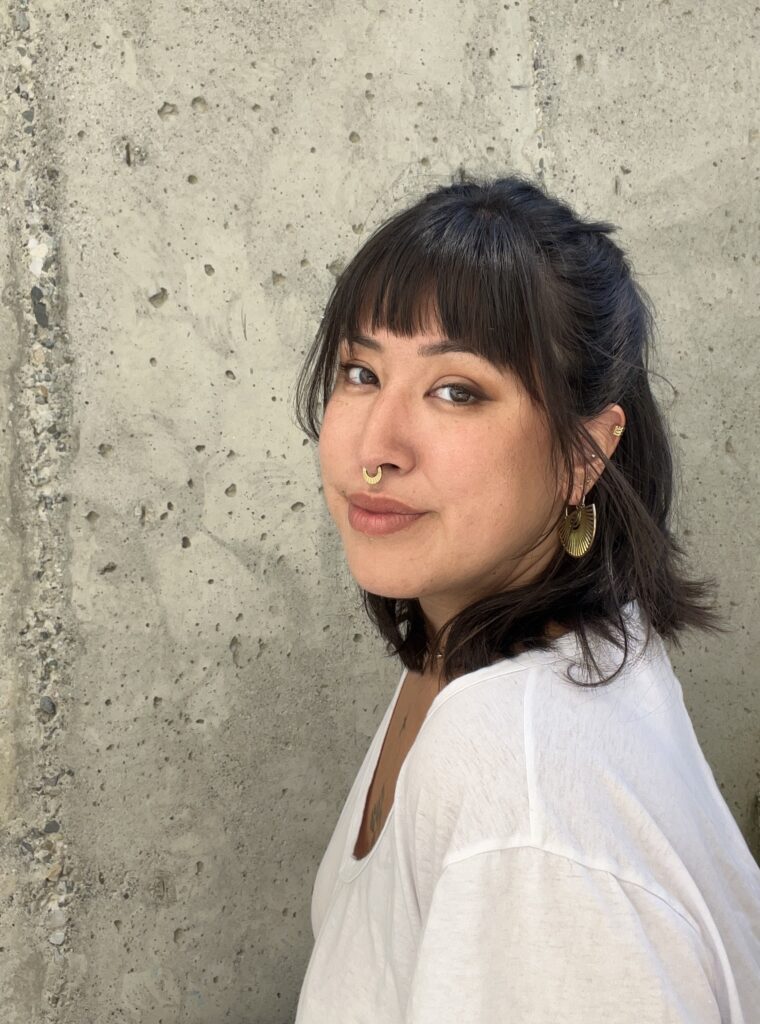
JessicSGidGang.Xaal / Shoshannah Greene
SGidGang.Xaal / Shoshannah Greene was born and raised on Haida Gwaii. She is a member of the St’awaas XaaydaGaay, from Hlkinil llnagaay. From a young age, Shoshannah always had a strong drive to be creative. She pursued a Bachelor of Media Arts at Emily Carr University, with a major in animation. During these years, her interests shifted from classical animation to classical Haida formline.
Today, Shoshannah works as a full-time artist, with a creative practice focused on Haida design, traditional and digital painting and illustration. Utilizing formline and passed-down cultural stories to colour her work, Shoshannah brings a contemporary lens to the Pacific Northwest artistic style of art-making.
Gwa’yi Music Revitalization and Festival FPCC Pilot Project
Webinar date: Wednesday November 26, 2025 3:00pm-4:30pm PT
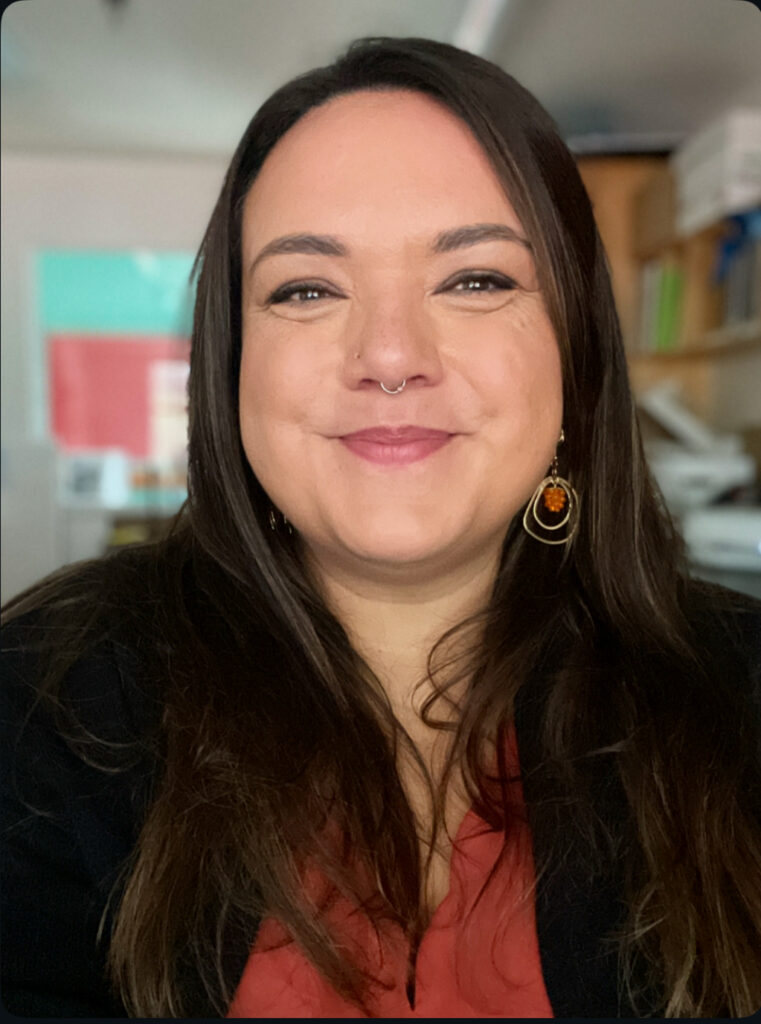
Lindsey Mae Willie
Lindsey Mae Willie is Musga̱makw Dzawada̱’enuxw from Gwa’yi (Kingcome Inlet, B.C.). With a strong foundation in media, she has established herself as a skilled camera operator and editor, contributing to numerous news and documentary productions that have aired on networks such as APTN, CTV, OMNI and CityTV.
In 2013, Lindsey directed her first film, Potlatch Keepers, a 45-minute documentary that premiered on APTN in December 2014. This deeply personal project brought her back to her traditional homelands – where she has lived for the past 12 years – to explore her culture and decolonize her ways of being. During this time, Lindsey committed herself to learning from Elders and community members. This journey led her to serve as the Land and Governance Coordinator for the Dzawada’enuxw First Nation, and later as the Language and Culture Teacher at Lilawagila Elementary School.
Lindsey is the Manager of the Nunwakola Cultural Society, where she oversees various arts, language, heritage and research projects benefiting the Dzawada’enuxw community. She continues to create films locally, and her work reflects her deep passion and commitment as an advocate for Musga̱makw Dzawada’enuxw cultural revitalization and sustainability. Lindsey strives to ensure that her community’s stories and traditions are preserved for future generations.
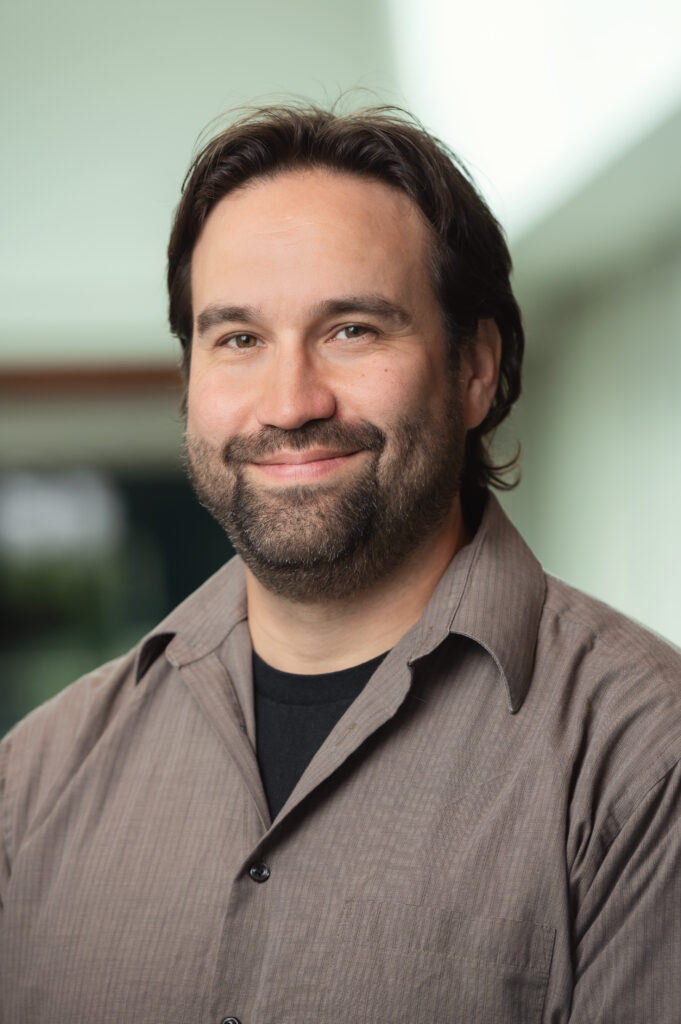
Michael Sharratt
Michael Sharratt was born and raised in Snuneymuxw territory (Nanaimo). He is a member of the Ts’il Kaz Koh nation (Burns Lake). He is the Workshop Coordinator for Gathering Our Voices as well as the Artistic Director for the Gwa’yi Music Festival in the Ukwanalis Village (Kingcome Inlet). Myc is also an award-winning Singer-Songwriter. He has been performing for 20 years across North America and Europe. His latest album was recorded live with the Vancouver Island Symphony at The Port Theatre in Nanaimo, BC.
FPCC Learning Series – Registration
Please register for each webinar that you would like to attend.
Week 1: October 20-23, 2025
How to Successfully Plan a Music Project: Everything You Need to Know!
Webinar date: Wednesday, October 22 @ 10am PT
Speakers: Sheri Ptolemy
Details: Sheri will share everything that she wished she knew when starting out in the music industry. This workshop will include an introduction to the business side of music and explore the creative side of planning, producing and rolling out a music project.
Dip siip’ntut Sm’algyax, das wii hana’nax :“we love sm’algyax, from these strong women”
Webinar date: Thursday, October 23 @ 10am PT
Speakers: Kitsumkalum Language Team
Details: Ama sah! Building on past community language efforts, this small team of Ts’msyen women has built momentum and continued striving for Sm’algyax fluency for almost three years. With each project grounded in the core value of Sagayt K’üülm Goot (Of One Heart), they will share how collaboration and care lead to strengthening fluency within their families, their team and their community of Kitsumkalum.
Week 2: October 27-31, 2025
Yahguudangang – To Pay Respect
Webinar date: CANCELLED
Speakers: Nika Collison and Lucy Bell
Details: Paying respect to the Ancestors before us and generations to come, Nika and Lucy will share their experiences in repatriation over the years. There will be practical advice for everyone, whether you’re just starting out or are deep into your own community’s repatriation journey.
Week 3: November 3-7, 2025
Unceded Expressions: Seeing Yourself Reflected Back on Your Own Territory
Webinar date: Wednesday, November 5 @ 10:00am PT
Speakers: Faith Sparrow-Crawford and Salia Joseph
Details: Faith and Salia, co-founders of Host Consulting, share their experience supporting local artist representation and visibility in Musqueam, Squamish, Tsleil-waututh territory. They will explore host nation art as place making and as sovereignty. They will talk about public art and how it can breathe and exist within a Salish context.
Mapping the Moment: A Visioning Journey
Webinar date: Thursday, November 6 @ 1:30pm PT
Speakers: Carleen August from the FPCC Coaching Team
Details: This webinar invites you to explore the landscape around your creative work. What’s thriving and where might there be opportunities? Join us to envision a path forward that can inspire ways to elevate your creative work.
Project Planning: Giving Your Vision the Structure It Needs
Webinar date: Friday, November 7 @ 10:00am PT
Speakers: Leah Anthony and Cindy Charleyboy
Details: Leah and Cindy from the FPCC Arts team share practical tips for project planning that are relevant across all fields of revitalization, whether in Arts, Culture, Language or Heritage. All experience levels welcome. Please bring paper and a pen to take notes or doodle. All OLS webinars include time for Q&A, so feel welcome to bring questions.
Week 4: November 10-14, 2025
Our Voices, Our Stories: Music and Language Revitalization Panel
Webinar date: Monday, November 10 @ 5:00pm PT
Speakers: Sabina Dennis and Kalilah Rampanen with Lisa Deptuck
Details: Join three B.C. First Nations musicians and language champions as they share their experiences in weaving together language and music revitalization. This panel discussion is sure to be an inspiring session for all artists at any stage of their language journey.
UNDRIP and the Arts
Webinar date: Thursday, November 13 @ 10am PT
Speakers: Lou-ann Neel
Details: In this webinar, Lou-ann explores the TRC’s Calls to Action and the UN Declaration on the Rights of Indigenous Peoples, and how both can be implemented into everyday practice for artists, arts organizations and funding agencies alike. She will reflect on how each can help to shape the way our communities build the supports and networks to ensure our artistic practices continue to be part of our living cultures and languages.
Week 5: November 17-21, 2025
Promoting Indigenous Cultural Heritage and Well-being through Food Sovereignty
Webinar date: Monday, November 17 @ 10am PT
Speaker: Jacob Beaton and Julian Napoleon
Details: In this panel discussion, Jacob and Julian will share their experience in supporting Indigenous food sovereignty and revitalizing time immemorial agricultural practices through their expertise in capacity building, training and running of First Nations food operations in B.C.
Finding My Voice in Formline: Studying Classical to Creating Contemporary
Webinar date: Tuesday, November 18 @ 11:30am PT
Speaker: Shoshannah Greene
Details: After spending eight years studying classical Haida art from the Ancestors and contemporary Haida artists, Shoshannah has integrated her various artistic passions into creating work that is her voice. Shoshannah will share highlights from her journey in developing her art practice, from designing, watercolour, animations and digital painting to children’s books.
Week 6: November 24-28, 2025
Gwa’yi Music Revitalization and Festival FPCC Pilot Project
Speaker: Lindsey Mae Willie and Myc Sharrat
Webinar date: Wednesday, November 26 @ 3pm PT
Details: A journey to Indigenous self-determination in the arts – recentering Dzawada’enuxw worldview in community arts practice.
FPCC Learning Series – Schedule
Past FPCC Learning Series
FPCC Learning Series has been happening since 2023. We are honoured to have supported both in-person and online events. To find out more click on the series title below.
Online Learning Series 2024
The Online Learning Series is a follow-up to our 2023 Summer Learning Series, which took place in person in Snuneymuxw territory. In 2024, we chose to host our Learning Series online, bringing the energy, ideas and education to a broader audience.
This webinar series is for anyone involved in revitalization work and covers various topics related to arts, language and cultural heritage revitalization. These webinars inform, inspire and provide hands-on, practical knowledge.
Our webinar presenters include leaders of successful Indigenous language, arts and heritage projects from B.C. First Nations communities. Topics range from specific language immersion tools and strategies to strategic cultural revitalization planning and project management.
Webinar Recordings
Watch the full series or discover each video by clicking on the playlist below.
Online Learning Series 2024 – Webinars, Speaker Bios & Resources
Creating Sḵwx̱wú7mesh Sníchim Speakers
In this webinar, these three Sníchim Foundation members share their experiences and lessons learned from delivering a successful adult immersion program from administrative and teacher perspectives.

Swu7wu Billy | Chen̓áx̱wtn
Language Coordinator / Instructor
Swu7wu Billy | Chen̓áx̱wtn is a descendant from the Sḵwx̱wú7mesh and Lil̓wát peoples, from a small village named Wíw̓ḵ’em which is in the town of Squamish along side the Sḵwx̱wú7mesh staḵw (Squamish river). He is a Language Coordinator and has had the honour of instructing both the Sḵwx̱wú7mesh Immersion Certificate and Diploma programs that have been offered through Simon Fraser University. Swu7wu has had a passion for indigenous language and culture his whole life. His dream is to create a world where his smén̓hem (descendants) won’t have to fight to learn their language or culture as both the ancestors and the current generations have had to.

Char George | S7atsáliya
Language Coordinator / Instructor
Char George | S7atsáliya (she/her) has lineage from both Sḵwx̱wú7mesh and Səlilwətaɬ. She is a proud speaker of the Sḵwx̱wú7mesh Sníchim (Squamish Language), and works as a Language Coordinator amongst a team of brilliant people. She has recently completed her Masters in Indigenous Languages and Linguistics via SFU. S7atsáliya has been a learner of the Sḵwx̱wú7mesh Sníchim for 8 years, and a teacher for 7 years. She also enjoys helping communities and organizations incorporate the Sḵwx̱wú7mesh Sníchim in a meaningful and appropriate way. S7atsáliya is endlessly grateful to all of her mentors/teachers from various backgrounds, including weaving, lifestyle and language. The incorporation of our true ways of being into our daily routine, is important to us, our ancestors, and the future generations to come.

Salia Joseph | St’ax̱í7alut
Executive Director
Salia Joseph | St’ax̱í7alut (she/her) is Sḵwx̱wú7mesh, Snuneymuxw, British and Jewish. She is a graduate of the First Nations and Indigenous studies program at UBC and cares deeply about decolonial and intersectional approaches to learning and caring for one another. Salia is the Executive Director of The Sníchim Foundation, a Sḵwx̱wú7mesh non-profit focused on language revitalization and immersion based learning. She is also part owner of Host Consulting Inc., a Musqueam, Squamish, Tsleil-Waututh consultancy focused on public art and decolonial dialogues.
ʔič̓ay̓apst̓ałin, we are lifting each other up: c̓išaaʔatḥ adult language intensive program
In this webinar, taaʔisumqa, Dawn Foxcroft shares the lessons learned from running a successful adult intensive language program for the nuučaan̓uł barkley dialect using the Where Are Your Keys approach to create more speakers of the language.
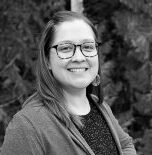
taaʔisumqa, Dawn Foxcroft
taaʔisumqa, Dawn Foxcroft is from c̓išaaʔatḥ, one of the nuučaan̓uł Nations along the west coast of Vancouver Island. She grew up surrounded by her elders and family attending haahuupayak elementary school where she learned her communities’ songs, dances, and where she started her language journey. taaʔisumqa is a graduate of the University of Victoria with a double major in Anthropology and Sociology and in 2016 completed a Master’s of Education also from UVic in Indigenous Language Revitalization. As Language Manager for her Nation, taaʔisumqa helps in the development and implementation of an adult intensive program for the nuučaan̓uł barkley dialect using the Where Are Your Keys approach to create more speakers of the language. She will share lessons learned from their successful programs.
Managing First Nation Heritage Infrastructure Projects: Challenges and Solutions
In this webinar, two FPCC Heritage Infrastructure Project grant recipients share some hard-earned lessons from their past experiences.

Bryce Ross
Bryce Ross is of English/Italian ancestry, born in Edmonton, raised in Oakville, ON, and now resides in Cache Creek, BC, on the unceded territory of the Secwepemc people. Bryce began his post-secondary educational journey at Vancouver Island University, graduating from the Education program in 2010. He has worked in and for the Tadoule Lake First Nation, Fort Nelson First Nation and is currently working for Skeetchestn Indian Band as the principal of the Community School. In this role, he manages the day-to-day dynamics of a school environment, tackles passion projects to enrich the learning atmosphere and works side-by-side with the school board to meet the mission and school growth plan goals. Over the last 5 years, Bryce has garnered experience with making capital projects come to fruition while navigating unique obstacles along the way and he looks forward to sharing his “aha” moments.

Alyssa Currie
Alyssa Currie is of English/Scottish ancestry, born and raised in Dawson Creek, BC; she now lives in Fort St John, on Dane-zaa and Treaty 8 territory. She returned to the Peace River region after completing a bachelor’s degree in English and History at the University of Northern British Columbia and a master’s in English at the University of Victoria. Alyssa is the Executive Director of the Tse’k’wa Heritage Society, a nonprofit partnership between Doig River, Prophet River, and West Moberly First Nations. In this role, she oversees day-to-day management of Tse’k’wa National Historic Site and works with the Board of Directors to implement their mission. Alyssa has spent the last three years working with Project Managers to oversee major infrastructure upgrades to the site and is eager to share some of the lessons learned during this transformation.
Dákwänje zhą kúnje – I will only speak our language
In this webinar, Khásha shares his language learning journey from stringing together a few phrases to his decision to only speak his language. He presents entirely in dákwänje (Southern Tutchone), with Shänch’ea as his translator.

Khásha | Stephen Reid
In my mommaʼs country my name is Khásha. Iʼm from the crow people on my mommaʼs side, from the Shadhäla people, thatʼs champagne people. my daddyʼs people are from Bella Bella B.C. Kimsquit people. I have a beautiful wife her name is chundaymą, and we have 5 beautiful children, 4 boys and 1 girl. I run a two year full-time program with a great group of people teaching adults dákwänje, our language. we run our program in däkwä̀kä̀da, thatʼs haines junction yukon. We’ve been running the program for 7 years now. Iʼve been learning my mommaʼs language since I was 19 years old! Only recently have I been able to string together a few phrases!

Shänch’ea | Mya
Shänch’ea, Mya Kinney is from the crow people. Her mother is Marsha Sparvier, her father Wes Kinney. Her grandmother is Chughala, Lorraine Allen, her grandfather Brian Kinney. She is a graduate of the dän k’e ghàkenīdän program. She is now training to be a language instructor with the current cohort. She also sometimes assists as a translator!
H̓ík̓án̓akvḷaṇts: We Will Rise Higher and Higher
In this webinar, Hḷagṃ̓iɫ | Fran Brown shares about the language plan for Haíɫzaqvḷa (the language of the Heiltsuk), which supports a number of language programs and initiatives across all ages and areas of the community.

Hḷagṃ̓iɫ | Fran Brown
Hḷagṃ̓iɫ, known as Frances D. Brown, is a descendent of the Heiltsuk and Kitasoo tribes. Frances’s mother is Láǧax̌náiyax̌ known as Shirley Windsor (nee Mason) of the Qvúkva ̓áitx̌v du Xaíxais tribes. Frances’s late father is Q̓ámas known as Charlie Windsor, of the W̓úyálítx̌v du Y̓ísdáitx̌v tribes.
As the Language Revitalization Manager, Frances has spent over two decades revitalizing the Heiltsuk language and culture. Frances is unwavering in her commitment to improving Haíɫzaqvḷa programs. She is a passionate community activist and can empower, motivate and inspire new learners to reach their potential. Frances has promoted a significant change in how revitalizing haíɫzaqvḷa is delivered through her supportive and thoughtful leadership. A firm believer in lifelong learning, Frances has composed songs and choreographed traditional dances. She views this as an extension of her work over the past 25 years.
Learning SENĆOŦEN Through our Worldview
In this webinar, MENEŦIYE shares lessons learned in her SENĆOŦEN language journey as a learner, teacher, mother and community member.

MENEŦIYE
MENEŦIYE Elisha Elliott comes from the W̱SÁNEĆ Nation and has worked for the W̱SÁNEĆ School Board for 16 years in the SȾÁ,SEN TŦE SENĆOŦEN language department. Her job has included hosting elder sessions, curriculum development, and building language proficiency. She has also been a teacher in the LE,NOṈET SCULÁUTW̱ SENĆOŦEN Immersion School for the past 11 years.
MENEŦIYE is deeply committed to working tirelessly for the survival of her language, as it is through language that we speak to Mother Earth and sustain our connection to our homelands, saltwater, and ancestors.
Navigating the Development of the Paul Creek Curriculum in Lingít
In this webinar, K’èdukà Jack shares why she and her team chose the Paul Creek Method, now known as the Indigenous Language Fluency Transfer System, to create fluent speakers of her community’s language, Łingít.

K’èdukà Jack
K’èdukà Jack was born a child of the Taku, and is daughter of Yvonne Jack, and grandchild of Evelyn Jack of the Yanyeidí Clan. She is a Taku River Tlingit, and was raised in a strong family that always empowered her to hold up the Tlingit values that were taught to her from birth. In 2014 she was introduced to a way of learning that was specifically designed for endangered indigenous languages. Through this effective methodology, she found a way to not only learn Lingít, but teach it as well. Even at a beginner level she was able to provide learners around her with opportunities to learn and teach together. Since that time, she has moved home to the Taku River Tlingit Territory, where she lives and works every day to revitalize the traditions and language of her people.
Gigi’ihl Algyax Ehl Angooga’m: Seeking spoken language from our ancestors
In this webinar, Jessica Starlund shares how her successful language immersion program uses the First Nations Language Essentials curriculum by implementing TPRS in the classroom as a main tool to teach Gitxsanimx.

Jessica Starlund
Jessica Starlund is Gitxsan and Nuu Chan Ullth. She recently inherited a Sigidim Hanak (Matriarch name), Sin’unks. She began learning Sim Algyax in Language Nest and currently continues to work in a First Nations school, Wilp Si’wilaksinxwhl Simgi’gyet Elementary, as a Gitxsan language teacher. Jessica has ten years of experience with learning and teaching Gitxsan to the majagalee (flowers of the village, reference to children), as well as supporting Gitxsan members to learn. Jessica is also doing work outside of her community, she is a Mentor Apprentice Coach with FPCC, community language events and currently enrolled in the University of Victoria’s Masters of Indigenous Language Program. It is Jessica’s passion and dedication to continue researching methods, knowledge and experience within the field of Indigenous Language Revitalization.
Indigenizing Immersive Tools: AR, VR, XR to Celebrate the Arts
In this webinar, Josh Conrad shares his personal journey to becoming a digital artist and gives tips on how other Indigenous artists can use extended reality (XR) to celebrate their community’s culture, arts, heritage and language.

Josh Conrad
Josh Conrad is a multi-disciplinary digital artist, curator, art director and the founder of Slow Studies Creative. Based on the unceded territories of the Musqueam, Squamish, and Tsleil-Waututh Nations, also known as Vancouver, BC, Josh is of Stó:lō and mixed European descent, with strong Nlaka’pamux ties and belongs to the Chawathil First Nation on S’ólh Téméxw.
His work spans 3D illustration, motion arts, projection mapping, installation and augmented reality. Using vibrant colors, abstract shapes, and textures inspired by memories and the lush natural environment around him, he creates tactile, dreamlike worlds that blur the line between reality and imagination. Josh enjoys collaborating with established and emerging artists, helping bring their works into the augmented reality space, where they can amplify their stories in immersive, shareable ways through social platforms.
Additional Resources
From Language Planning to Implementation: A Nsyilxcen Story
In this webinar, Danielle Saddleman and Sarah Alexis from the Okanagan Indian Band share how they developed and implemented a Nsyilxcən language plan where programs supported and built on each other. They also share successes and how they addressed challenges along the way.

Danielle Saddleman
Okanagan Indian Band
Danielle Saddleman comes from nkmaplqs, the Head of the Lake, Okanagan Indian Band (OKIB) in Vernon, British Columbia. She is the daughter of the late Chief Albert Saddleman who was a strong passionate syilx leader in Title and Rights, and who is well known within the Okanagan Nation for his dedication to the Return of the Salmon. She is a champion, advocate, and leader for language and cultural renewal in her home community of the Okanagan Indian Band. As Language and Culture Lead, Danielle led the development of a community engagement strategy to enhance and support the acquisition of nsyilxcen language and culture within Okanagan Indian Band (OKIB) and for the planning and management of language and culture programs. Danielle is passionate about language revitalization, traditional knowledge, and the health and wellbeing of her people.

Sarah Alexis
Okanagan Indian Band
way̓ x̌ast sx̌lx̌alt ipsnəqsilxʷ. iskʷíst sk̓awílx. kn t̓l naʔsntkʷitkʷ. inmistəm ciqʷlx iʔ skʷísts, intum tybee iʔ skʷísts. skawilx – Sarah Alexis is a member of the Okanagan Indian Band located at the head of Okanagan Lake in British Columbia, Canada. Her heritage roots are Dakelh and Syilx. skawilx continues to focus her work involved in siw̓łkʷ (water) advocacy and nsyilxcən revitalization. She actively contributes to the larger body of community and scholarly research for the Syilx People. She is in the final stages of her Master of Arts in Interdisciplinary Studies at the University of British Columbia Okanagan. She is passionate about nsyilxcən revitalization and teaching.
Summer Learning Series 2023
The Summer Learning Series was hosted in 2023, and was the first FPCC Learning Series event. The objective of the Summer Learning Series was to encourage and empower participants through relevant, practical, and meaningful skills-based learning experiences.
2023 FPCC Summer Learning Series: huncewstuxw tu xe’ xe’ sqwel ‘Bringing Back the Sacred Language’ – Language Revitalization Skill Development
huncewstuxw tu xe’ xe’ sqwel
The hul’q’umi’num’ phrase ‘huncewstuxw tu xe’ xe’ sqwel’ was generously provided by Snuneymuxw First Nation and translates to bringing back the sacred language. The first word ‘huncewstuxw’ holds additional context in hul’q’umi’num’ which signifies “bringing something important or sacred down from the mountain that was stored there”.
huncewstuxw tu xe’ xe’ sqwel ‘Bringing Back the Sacred Language’ was for B.C. First Nations Individuals who wanted to learn and gain practical skills to implement or strengthen language revitalization projects in their communities.
About the event
The series brought together individuals at the early stages of their careers in language revitalization. Participants chose between one of five themes: Immersion, Where Are Your Keys (WAYK), Documentation, Planning and Technology. Each week engaging keynotes from Indigenous leaders Wesley Y. Leonard and Hḷagṃ̓iɫ, Frances Brown spoke about the importance of language revitalization. As a result of this event, 91 First Nations people from across B.C. developed a new network and walked away with valuable tools, knowledge and expanded skills. Get the full recap below.
The event took place in Snuneymuxw (Nanaimo), B.C. from August 14–18, 2023 and August 21–25, 2023.
Acknowledgement
We would like to express our deepest gratitude to Snuneymuxw First Nation and the mulstímuxw (people) for their contributions in supporting this event and for generously providing a name for the event in Hul’qumi’num’ – the language of the land and the people.
This program was funded by the Department of Canadian Heritage as a result of the Government of Canada’s Indigenous Languages Act.



